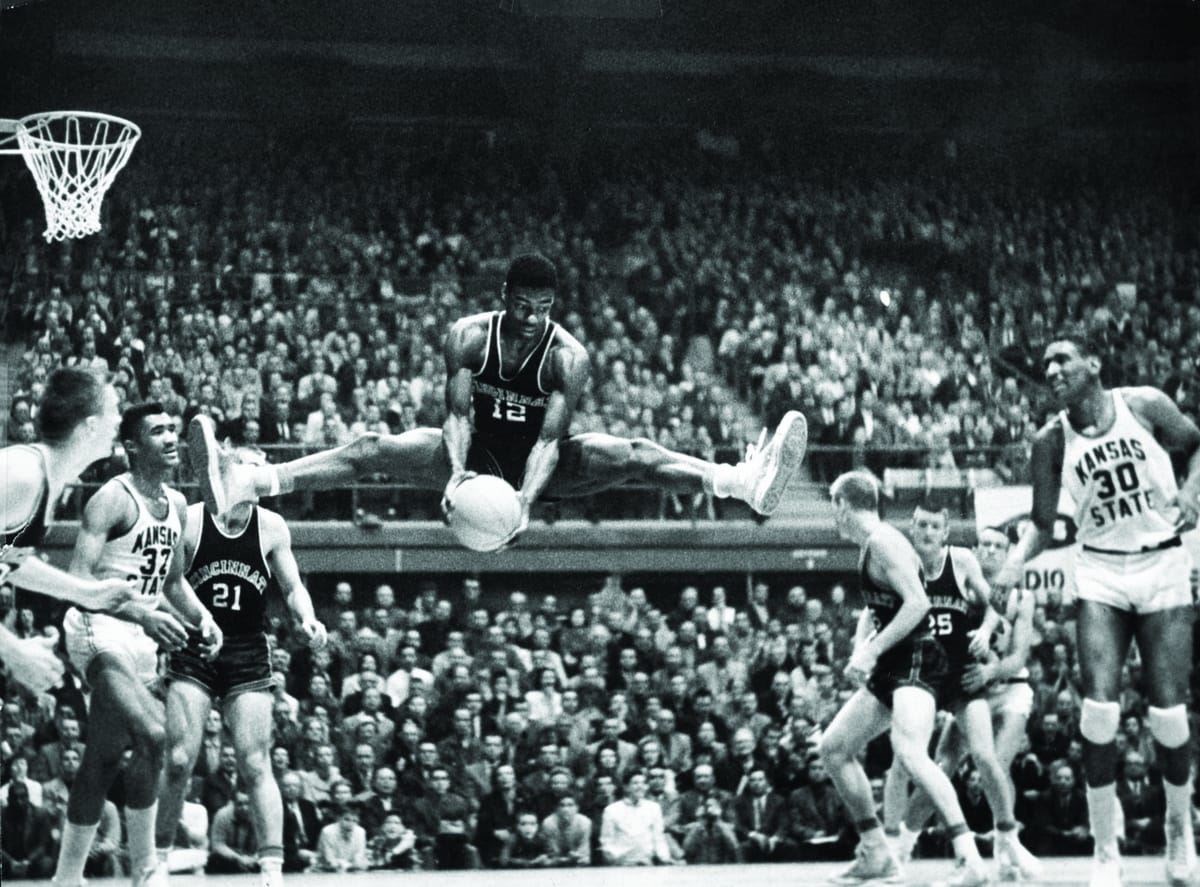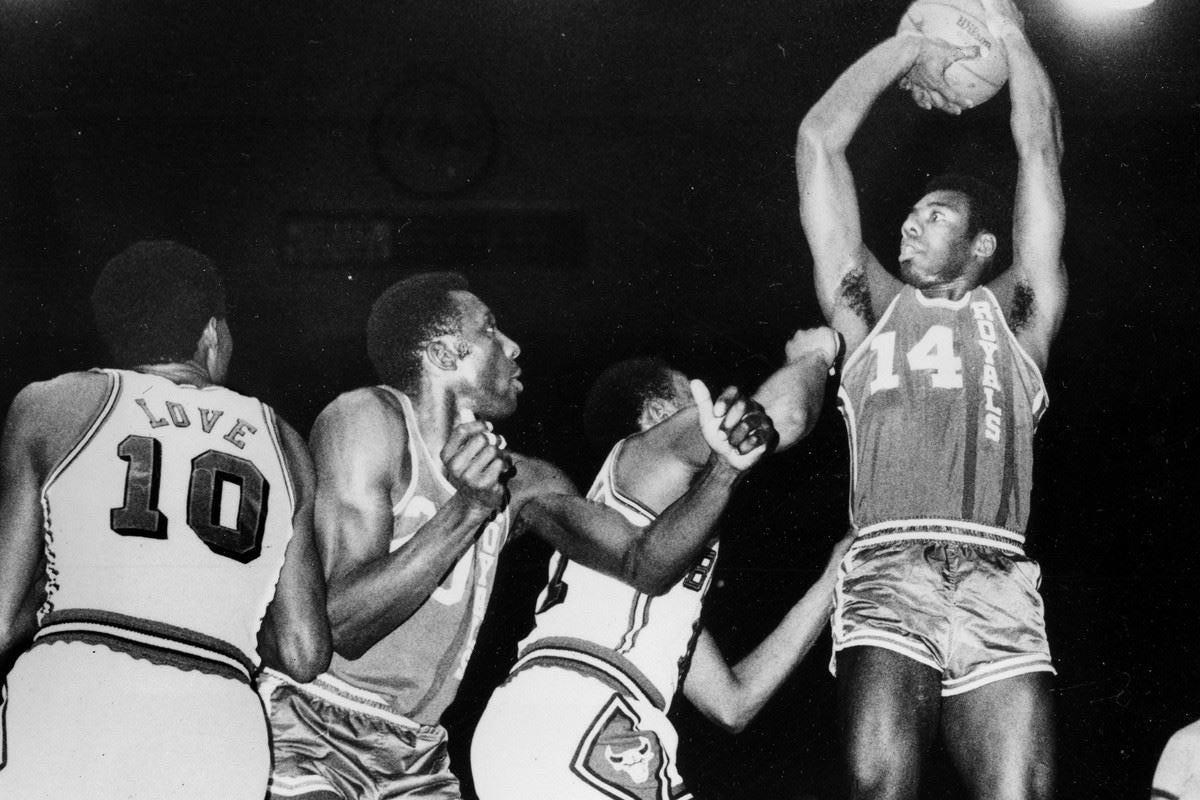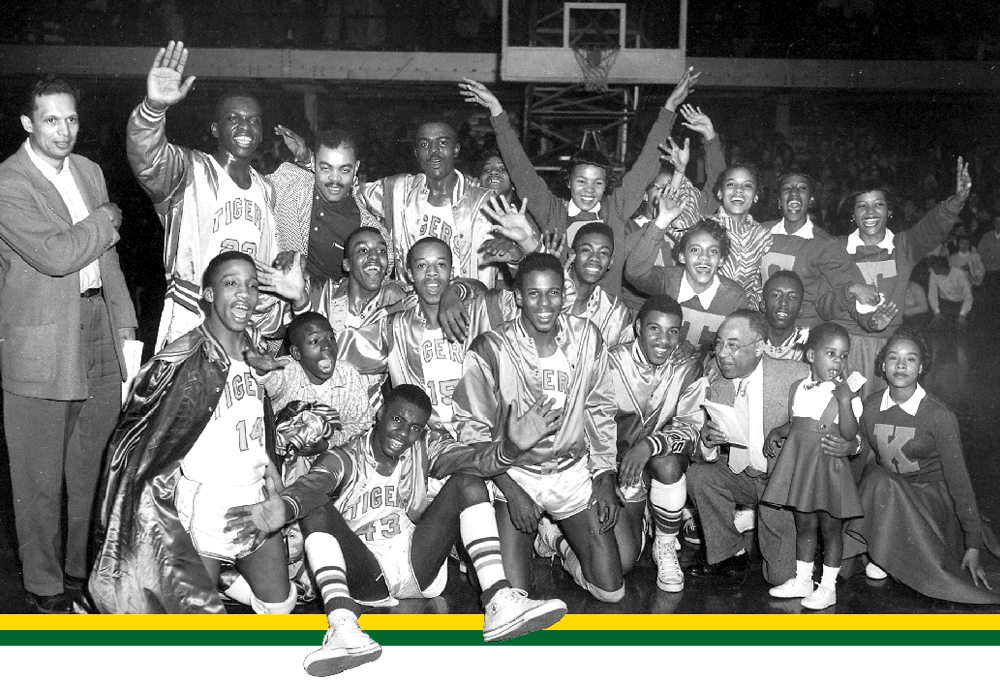If you're a basketball player, you've got to shoot.
 Oscar Robertson's Iconic Dunkatheletsquarterly.comClank! The irritating melody of a missed basketball shot. This tune can easily destroy a basketball player’s confidence and hope. However, Oscar Robertson was an exception to this; he could hear this sound thousands of times, but it wouldn’t stop him from taking another shot. Oscar Robertson grew up and developed his love for basketball in the impoverished projects of Indianapolis. His experience in poverty shaped him into a hard-worker who would go on to enter the NBA in 1960. Robertson quickly established a name for himself, and showed early symptoms of an NBA superstar. Throughout his fourteen year career, Robertson achieved greatness and had legendary performances that people have never seen before. When he retired, Robertson cemented himself as one of the greatest players in the NBA’s history. People admire and look up to the individuals that have been able to bring change, and to those who are able to defy all odds. Oscar Robertson, a former NBA all-star, demonstrated the traits of a hero through his immense impact on the NBA, and his perseverance to overcome the obstacles presented to him during a time of racial segregation.
Oscar Robertson's Iconic Dunkatheletsquarterly.comClank! The irritating melody of a missed basketball shot. This tune can easily destroy a basketball player’s confidence and hope. However, Oscar Robertson was an exception to this; he could hear this sound thousands of times, but it wouldn’t stop him from taking another shot. Oscar Robertson grew up and developed his love for basketball in the impoverished projects of Indianapolis. His experience in poverty shaped him into a hard-worker who would go on to enter the NBA in 1960. Robertson quickly established a name for himself, and showed early symptoms of an NBA superstar. Throughout his fourteen year career, Robertson achieved greatness and had legendary performances that people have never seen before. When he retired, Robertson cemented himself as one of the greatest players in the NBA’s history. People admire and look up to the individuals that have been able to bring change, and to those who are able to defy all odds. Oscar Robertson, a former NBA all-star, demonstrated the traits of a hero through his immense impact on the NBA, and his perseverance to overcome the obstacles presented to him during a time of racial segregation.
 Oscar Robertson playing in the NBAtheringer.comMany know Oscar Robertson as a former basketball all-star who greatly influenced the game and the NBA through his actions on and off the court. Before Oscar Robertson entered the NBA, the guard position was for quick, small players who can pass and score near the perimeter of the three-point line. When he was drafted into the NBA, “Robertson was moved from forward to guard, though some thought he was too tall for the position at 6 ′ 5 ″. Instead, Robertson redefined the position, adding rebounding and other aspects and attitudes of forwards” (Robertson). Upon entering the NBA, Robertson, a former forward who was expected to score from the inside and grab rebounds, gave the guard position a new definition. No one ever imagined a guard attacking the inside or being physical like a forward or a center because they were only expected to fill the role of a passer and shooter. Many players in the guard position would just stick to their role, and they would never surpass this stereotype. However, Robertson was able to rewrite the position, and by combining the aspects of a forward with a skill set of a guard, he forever changed the playstyle of the position. Oscar Robertson should be idolized because he brought tremendous change into the NBA through his versatile skill-set, and he laid down the foundation for the all-around guards that are seen in today’s NBA like Russell Westbrook. Robertson didn’t only revolutionize the NBA on the court but also off the court, or rather in a courtroom. “As president of the NBA Players Association from 1965-74, he made an even bigger impact on basketball with a class action anti-trust lawsuit against the NBA. A 1976 settlement, known as the "Oscar Robertson Rule", helped NBA players become the first major professional athletes to achieve free agency” (“Founder”). By pioneering free agency, Oscar Robertson impacted the NBA and basketball forever. Robertson saw how players were restricted by the teams that they were drafted to, and how players weren’t allowed to leave by their choice. He wanted change and fought against NBA when other players wouldn’t make a stand. Free agency erased the rule where players were bound to one team for life, and it allowed them to join other teams. Oscar Robertson is a deserving hero because without fighting for free agency and making a difference, the championship caliber teams that are seen in today’s NBA wouldn’t be possible. Through the great impact the Oscar Robertson had, the NBA and basketball have developed into the exciting source of entertainment that people all around the world enjoy.
Oscar Robertson playing in the NBAtheringer.comMany know Oscar Robertson as a former basketball all-star who greatly influenced the game and the NBA through his actions on and off the court. Before Oscar Robertson entered the NBA, the guard position was for quick, small players who can pass and score near the perimeter of the three-point line. When he was drafted into the NBA, “Robertson was moved from forward to guard, though some thought he was too tall for the position at 6 ′ 5 ″. Instead, Robertson redefined the position, adding rebounding and other aspects and attitudes of forwards” (Robertson). Upon entering the NBA, Robertson, a former forward who was expected to score from the inside and grab rebounds, gave the guard position a new definition. No one ever imagined a guard attacking the inside or being physical like a forward or a center because they were only expected to fill the role of a passer and shooter. Many players in the guard position would just stick to their role, and they would never surpass this stereotype. However, Robertson was able to rewrite the position, and by combining the aspects of a forward with a skill set of a guard, he forever changed the playstyle of the position. Oscar Robertson should be idolized because he brought tremendous change into the NBA through his versatile skill-set, and he laid down the foundation for the all-around guards that are seen in today’s NBA like Russell Westbrook. Robertson didn’t only revolutionize the NBA on the court but also off the court, or rather in a courtroom. “As president of the NBA Players Association from 1965-74, he made an even bigger impact on basketball with a class action anti-trust lawsuit against the NBA. A 1976 settlement, known as the "Oscar Robertson Rule", helped NBA players become the first major professional athletes to achieve free agency” (“Founder”). By pioneering free agency, Oscar Robertson impacted the NBA and basketball forever. Robertson saw how players were restricted by the teams that they were drafted to, and how players weren’t allowed to leave by their choice. He wanted change and fought against NBA when other players wouldn’t make a stand. Free agency erased the rule where players were bound to one team for life, and it allowed them to join other teams. Oscar Robertson is a deserving hero because without fighting for free agency and making a difference, the championship caliber teams that are seen in today’s NBA wouldn’t be possible. Through the great impact the Oscar Robertson had, the NBA and basketball have developed into the exciting source of entertainment that people all around the world enjoy.
 Oscar Robertson and his high school team as state championsNUVO.netBefore joining the NBA, Oscar Robertson was faced with multiple hardships because of his race, but he persisted and overcame these hurdles in order to realize his goals. When Robertson played high-school basketball, it was uncommon to see an all-black team make the state championship. However, Robertson’s team and another all-black team fought their way to the state championship game, and how “For the first time, two all-black schools were meeting for the state championship. Not only might Indianapolis have its first state champion – Indiana would have its first all-black state champion. That would also be a first for the entire country” (Robertson, “How an All-Black High School Team”). Robertson’s former high-school rival, Bobby Plump, also shares his observations on the prejudice surrounding Robertson’s all-black team: “Plump, 80, said he heard racial slurs from motorists in downtown Indianapolis before Milan’s game against Robertson’s team. ‘People would stop, roll down their windows and yell, ‘Beat those [expletive]!’ Plump said. ‘It shocked the hell out of us. There was prejudice, absolutely. We said, ‘What are these people talking about? What’s the matter with them?’ ” (Marcus). Robertson explains how history was made when his high-school team made the state championship, and he also stated that it would be the first time that the country has ever had an all-black state champion. The path that Robertson’s team took was challenging and difficult. People would constantly belittle and look down on them because of their race. By winning the state title at a time when blacks were heavily oppressed, shows Robertson’s heroism because he didn’t fall under the oppression and broke through all expectations in order to accomplish his goals. Oscar Robertson had shown that he was an outstanding basketball player with a state championship under his belt, and his skill-set attracted all types of colleges that each wanted him to play for their team: “He wanted to play at his home state's Indiana University, but was not invited there because of the coach's racism. Instead, Robertson chose the University of Cincinnati, in part because it was close to his hometown” (Robertson). Despite the rejection from his hometown university, Robertson was successful in Cincinnati, and “During Robertson's three active years with the Cincinnati Bearcats, he was dominant as a forward. He led scoring of the National Collegiate Athletic Association (NCAA) University Division each of those three years, averaging 33.8 points per game. Robertson was named a first team All-American three times as well’’ (Robertson). It was apparent that Robertson was a great basketball player by the time he got to the collegiate level, but because of his ethnicity he was denied. However, Robertson was able to create a path for himself when he went on to join the University of Cincinnati and made history with all of his accomplishments in the NCAA. Oscar Robertson was different because he wouldn’t give up his love for basketball, and even after a crushing rejection he was able to find another way. His road to success in college basketball after being cast away due to racial prejudice, shows how he displayed heroism because he fought through the injustice and achieved greatness. In the face of adversity, Oscar Robertson would never quit. He became a determined person who was able to overcome struggles fueled by the hate and prejudice manifested by society.
Oscar Robertson and his high school team as state championsNUVO.netBefore joining the NBA, Oscar Robertson was faced with multiple hardships because of his race, but he persisted and overcame these hurdles in order to realize his goals. When Robertson played high-school basketball, it was uncommon to see an all-black team make the state championship. However, Robertson’s team and another all-black team fought their way to the state championship game, and how “For the first time, two all-black schools were meeting for the state championship. Not only might Indianapolis have its first state champion – Indiana would have its first all-black state champion. That would also be a first for the entire country” (Robertson, “How an All-Black High School Team”). Robertson’s former high-school rival, Bobby Plump, also shares his observations on the prejudice surrounding Robertson’s all-black team: “Plump, 80, said he heard racial slurs from motorists in downtown Indianapolis before Milan’s game against Robertson’s team. ‘People would stop, roll down their windows and yell, ‘Beat those [expletive]!’ Plump said. ‘It shocked the hell out of us. There was prejudice, absolutely. We said, ‘What are these people talking about? What’s the matter with them?’ ” (Marcus). Robertson explains how history was made when his high-school team made the state championship, and he also stated that it would be the first time that the country has ever had an all-black state champion. The path that Robertson’s team took was challenging and difficult. People would constantly belittle and look down on them because of their race. By winning the state title at a time when blacks were heavily oppressed, shows Robertson’s heroism because he didn’t fall under the oppression and broke through all expectations in order to accomplish his goals. Oscar Robertson had shown that he was an outstanding basketball player with a state championship under his belt, and his skill-set attracted all types of colleges that each wanted him to play for their team: “He wanted to play at his home state's Indiana University, but was not invited there because of the coach's racism. Instead, Robertson chose the University of Cincinnati, in part because it was close to his hometown” (Robertson). Despite the rejection from his hometown university, Robertson was successful in Cincinnati, and “During Robertson's three active years with the Cincinnati Bearcats, he was dominant as a forward. He led scoring of the National Collegiate Athletic Association (NCAA) University Division each of those three years, averaging 33.8 points per game. Robertson was named a first team All-American three times as well’’ (Robertson). It was apparent that Robertson was a great basketball player by the time he got to the collegiate level, but because of his ethnicity he was denied. However, Robertson was able to create a path for himself when he went on to join the University of Cincinnati and made history with all of his accomplishments in the NCAA. Oscar Robertson was different because he wouldn’t give up his love for basketball, and even after a crushing rejection he was able to find another way. His road to success in college basketball after being cast away due to racial prejudice, shows how he displayed heroism because he fought through the injustice and achieved greatness. In the face of adversity, Oscar Robertson would never quit. He became a determined person who was able to overcome struggles fueled by the hate and prejudice manifested by society.
Oscar Robertson isn’t just a retired pro-basketball player, he is also a beacon of heroism because of how he was able to leave an everlasting influence on the game and the NBA, and because of his grit to rise above the adversity he faced. Oscar Robertson stood out from other basketball players because of how he was able to redefine aspects of basketball, and it didn’t matter what faced him, Robertson pursue his objectives. He put his career on the line when he fought against the NBA organization just so that players can more freedom. Oscar Robertson’s legacy is bigger than basketball because of his actions of influencing and persevering. The amount of dedication that Robertson had displayed makes him a role model for others. People know him for all of his accomplishments in the NBA, but he is also admired for his monumental efforts in following his ambitions. Oscar Robertson showed that even after a miss, more shots need to be taken in order to score.
Works Cited
“Founder.” National Basketball Retired Players Association, NBRPA, 2018, www.legendsofbasketball.com/founders/oscar-robertson/. Accessed May
Marcus, Steven. “Robertson Still Feels Sting of Racism in High School.” Newsday, Newsday, 8 Feb. 2018, www.newsday.com/sports/basketball/oscar-robertson-still-feels-sting-of-racism-from-high-school-days-1.13067419.
Robertson. “How an All-Black High School Team Starring Oscar Robertson Changed Hoosier Hysteria.” The Undefeated, The Undefeated, 27 Mar. 2017, theundefeated.com/features/oscar-robertson-crispus-attucks-tigers/.
Robertson.", "Oscar. “Oscar Robertson.” Gale Library of Daily Life: Slavery in America, Encyclopedia.com, 2018, www.encyclopedia.com/people/sports-and-games/sports-biographies/oscar-robertson#3404707663.
Page created on 5/24/2018 6:27:36 PM
Last edited 5/28/2018 3:36:23 PM
